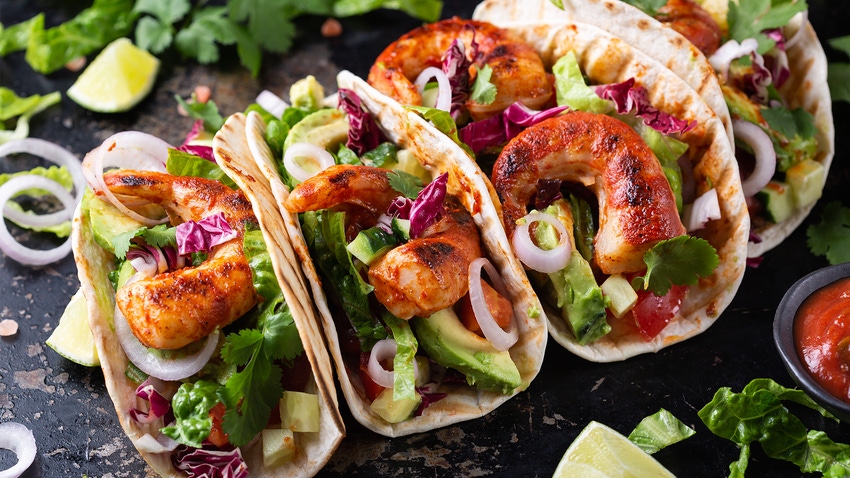Business Bites: Steakholder Foods reveals world’s first 3D-printed shrimp
On this week’s plate: Steakholder Foods announces first 3D-printed shrimp, designed to mimic the texture and flavor of conventional shrimp; StePacPPC develops new packaging tech to make mushrooms last longer on the shelf; EQUII joins forces with Bridor on protein-rich bakery staples; and more.

At a Glance
- World’s first 3D-printed shrimp using shrimp-flavored ink offers a more sustainable scampi.
- New packaging technology extends mushrooms’ usual one-week shelf life.
- EQUII and Bridor announce partnership to expand the reach of protein-rich bread products.
The plant-based market is having a moment. Valued at $11.3 billion in 2023, it’s expected to more than triple in size over the next decade to reach a valuation of $36 billion by 2033, per Future Market Insights. It’s no surprise that these types of products are entering the marketplace in this category, including the most recent alt-seafood products from Steakholder Foods. Also in this week’s column, StePacPPC unveils sustainable packaging that can extend the lifespan of fresh produce like mushrooms. Learn more below.
The world’s first 3D-printed shrimp is finally here
Food tech company Steakholder Foods is diligently working to create an array of alt-meat and seafood products using innovative 3D-printing technology. On the heels of launching 3D-printed cultivated grouper and eel, the Israel-based company recently unveiled the world’s first 3D-printed shrimp, which it said mimics the texture and flavor of conventional shrimp. The plant-based shrimp was printed on Steakholder Foods’ proprietary DropJet printer, designed for fish and seafood printing, using shrimp-flavored ink. With 7.6 million tons of shrimp was harvested in 2023, according to the company, the 3D-printing solution offers a more sustainable, eco-friendly alternative to traditional shrimp farming.
“By unveiling a second new species of plant-based, 3D-printed seafood this month, we expect to position Steakholder Foods to sell and deliver its first DropJet printer in 2024, offering partners and customers a unique opportunity to benefit from the expanding global seafood market, while making the right kind of impact on the environment,” Arik Kaufman, CEO of Steakholder Foods, said.
StePacPPC introduces sustainable packaging for mushrooms that extends freshness, reduces waste
The global mushroom market is booming. Valued at $50 billion in 2021, the market is expected to experience a compound annual growth rate (CAGR) of 9.7% from 2022 to 2030, according to market research firm Grand View Research. Despite the increasing demand for mushrooms, they have a very short shelf life — less than one week — which hinders growers and shippers worldwide. Functional packaging company StePacPPC is working to change that. The Israel-based company created modified atmosphere packaging (MAP) films to preserve a variety of whole and sliced mushrooms, including white button and portobello (Agaricus bisporus), oyster (Pleurotus ostreatus), Lion’s mane (Hericium erinaceus) and shiitake (Lentinula edodes). Scientific research has shown MAP dramatically extends the shelf life of fresh produce, delays spoilage, and prevents the growth of bacteria and other microorganisms. The high-water vapor transmission rate of StePacPPC’s Xtend and Xflow MAP films have successfully slowed aging, reduced dehydration and expelled excess moisture for fresh mushrooms.
“In post-harvest lab and field trials, our films have demonstrated abilities to maintain the freshness and wholesome appearance of mushrooms,” Gary Ward, Ph.D., CTO at StePacPPC, said. “This effectively stretches their shelf life from just a few days to more than two weeks, generating meaningful reductions in food waste.”
Bridor, EQUII partner on protein-rich baked goods
EQUII, a food tech company specializing in bread containing complete proteins, announced a partnership with Bridor, a leader in high-quality bakery products. This spring, the companies will launch three new products featuring EQUII's Complete Protein Blend for Bridor’s North American food service clients, including hotels, restaurants, coffee shops, airlines and more. The products are artisanal dinner rolls (40 g of protein), ciabatta sandwich carriers (105 g) and bread loaves (500 g). EQUII also brings R&D expertise to optimize product development, quality and sustainability at Bridor’s facilities.
“Protein is something I think about a lot as a vegetarian,” Monica Bhatia, co-founder of EQUII, said. “So, I decided to combine my experience from the world of fermentation, food and biotech to see if we could make staple food healthier by enriching them with complete proteins without losing any taste or texture … incorporating nutrition in a way that’s easy. It’s familiar, it’s tasty. It’s bread.”
New generative AI enhances supply chain through self-driven forecasting
Kraft Heinz is reportedly creating an internal generative AI app, known as KraftGPT, which functions as an “ask me anything” application for employees to obtain quick insights into various topics. The goal is to create a “self-driving supply chain” that lets factories predict when lines will go down and better use customer data for forecasts. CPGs such as Colgate-Palmolive and Johnsonville are developing similar tools. Brooke Hodierne, EVP of strategy consulting for Insite AI, explained why.
“AI has the unmatched ability to optimize a variety of decisions for consumer brands,” Hodierne said. “It can incorporate all available data … and rationalize it to enable fast decision-making. With those insights, CPGs can predict future scenarios, forecast demand and create curated recommendations all the way down to the distribution point.”
New report shows majority of consumers are interested in trying animal-free cheese
Americans love their cheese, but the majority are also willing to try animal-free cheese products made via precision fermentation, according to a new survey. New Culture’s 2024 Market Research Report, “A Cheese Revolution: Unveiling the Appetite for a New Kind of Mozzarella Among Pizza Lovers,” found four out of five consumers would purchase nondairy mozzarella if it was available at their favorite pizzeria. What’s more, 80% of respondents interested in cow-free mozzarella identified as omnivores. The survey, commissioned in partnership with market research firm AMC Global, also found people are willing to pay up to $4 more per pizza featuring animal-free mozzarella cheese like the one produced by New Culture. The company, which is dedicated to establishing an “animal-free dairy future,” is part of Precision Fermentation Alliance (PFA), the only trade organization dedicated to precision fermentation.
“Precision fermentation has been used for decades in the food and pharmaceutical industries,” Ben Freedman, chief of staff at New Culture, said. “As a new wave of precision fermentation food companies has popped up over the last several years, having a convening organization that can support the continued growth of this technology will be quite beneficial. PFA is well positioned to play an important industry role as new products, including New Culture’s animal-free mozzarella, come to market alongside those precision fermentation ingredients and products that gained consumer acceptance decades ago.”
Ingredion, Better Juice team up on sugar reduction technology
A global provider of specialty ingredients, Ingredion recently announced its venture investment arm, Ingredion Ventures, will lead a Series A funding round for startup Better Juice to speed up implementation of its sugar reduction technology in the U.S. market. Through an enzymatic process that converts sugars into nondigestible compounds such as dietary fibers, Better Juice removes simple sugars in juice-based beverages, concentrates and other natural liquids, while preserving beneficial vitamins, minerals and organic acids. The company said this process can reduce sugar content by up to 80%.
“The Better Juice technology adds a completely new dimension to our portfolio of sugar reduction solutions for food and beverage brands on a mission to meet increased consumer demand for less sugar,” Nate Yates, sugar reduction business leader at Ingredion, said. “This technology also provides manufacturers with more options to successfully reduce sugar without compromising on great taste or nutrition.”
About the Author(s)
You May Also Like








